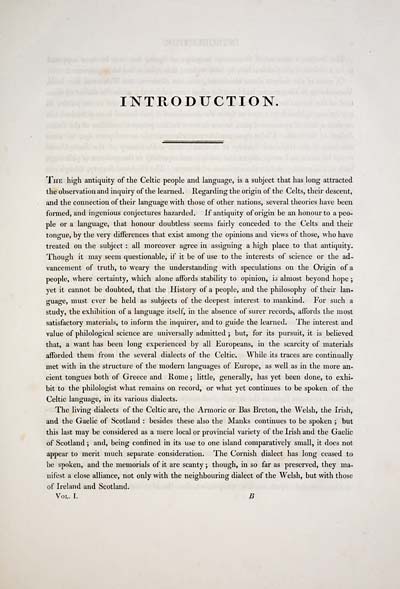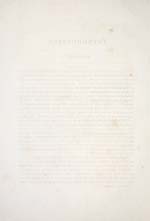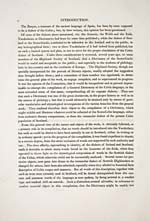Download files
Complete book:
Individual page:
Thumbnail gallery: Grid view | List view

INTRODUCTION.
The high antiquity of the Cehic people and language, is a subject that has long attracted
the observation and inquiry of the learned. Regarding the origin of the Celts, their descent,
and the connection of their language with those of other nations, several theories have been
formed, and ingenious conjectures hazarded. If antiquity of origin be an honour to a peo-
ple or a language, that honour doubtless seems fairly conceded to the Celts and their
tongue, by the very differences that exist among the opinions and views of those, who have
treated on the subject : all moreover agree in assigning a high place to that antiquity.
Though it may seem questionable, if it be of use to the interests of science or the ad-
vancement of truth, to weary the understanding with speculations on the Origin of a
people, where certainty, which alone affords stability to opinion, is almost beyond hope ;
yet it cannot be doubted, that the History of a people, and the philosophy of their lan-
guage, must ever be held as subjects of the deepest interest to mankind. For such a
study, the exhibition of a language itself, in the absence of surer records, affords the most
satisfactory materials, to inform the inquirer, and to guide the learned. The interest and
value of philological science are universally admitted ; but, for its pursuit, it is believed
that, a want has been long experienced by all Europeans, in the scarcity of materials
afforded them from the several dialects of the Celtic. While its traces are continually
met with in the structure of the modern languages of Europe, as well as in the more an-
cient tongues both of Greece and Rome ; little, generally, has yet been done, to exhi-
bit to the philologist what remains on record, or what yet continues to be spoken of the
Celtic language, in its various dialects.
The living dialects of the Celtic are, the Armoric or Bas Breton, the Welsh, the Irish,
and the Gaelic of Scotland : besides these also the Manks continues to be spoken ; but
this last may be considered as a mere local or provincial variety of the Irish and the Gaelic
of Scotland ; and, being confined in its use to one island comparatively small, it does not
appear to merit much separate consideration. The Cornish dialect has long ceased to
be spoken, and the memorials of it are scanty ; though, in so far as preserved, they ma-
nifest a close alliance, not only with the neighbouring dialect of the Welsh, but with those
of Ireland and Scotland.
Vol.. I. B
The high antiquity of the Cehic people and language, is a subject that has long attracted
the observation and inquiry of the learned. Regarding the origin of the Celts, their descent,
and the connection of their language with those of other nations, several theories have been
formed, and ingenious conjectures hazarded. If antiquity of origin be an honour to a peo-
ple or a language, that honour doubtless seems fairly conceded to the Celts and their
tongue, by the very differences that exist among the opinions and views of those, who have
treated on the subject : all moreover agree in assigning a high place to that antiquity.
Though it may seem questionable, if it be of use to the interests of science or the ad-
vancement of truth, to weary the understanding with speculations on the Origin of a
people, where certainty, which alone affords stability to opinion, is almost beyond hope ;
yet it cannot be doubted, that the History of a people, and the philosophy of their lan-
guage, must ever be held as subjects of the deepest interest to mankind. For such a
study, the exhibition of a language itself, in the absence of surer records, affords the most
satisfactory materials, to inform the inquirer, and to guide the learned. The interest and
value of philological science are universally admitted ; but, for its pursuit, it is believed
that, a want has been long experienced by all Europeans, in the scarcity of materials
afforded them from the several dialects of the Celtic. While its traces are continually
met with in the structure of the modern languages of Europe, as well as in the more an-
cient tongues both of Greece and Rome ; little, generally, has yet been done, to exhi-
bit to the philologist what remains on record, or what yet continues to be spoken of the
Celtic language, in its various dialects.
The living dialects of the Celtic are, the Armoric or Bas Breton, the Welsh, the Irish,
and the Gaelic of Scotland : besides these also the Manks continues to be spoken ; but
this last may be considered as a mere local or provincial variety of the Irish and the Gaelic
of Scotland ; and, being confined in its use to one island comparatively small, it does not
appear to merit much separate consideration. The Cornish dialect has long ceased to
be spoken, and the memorials of it are scanty ; though, in so far as preserved, they ma-
nifest a close alliance, not only with the neighbouring dialect of the Welsh, but with those
of Ireland and Scotland.
Vol.. I. B
Set display mode to: Large image | Transcription
Images and transcriptions on this page, including medium image downloads, may be used under the Creative Commons Attribution 4.0 International Licence unless otherwise stated. ![]()
| Early Gaelic Book Collections > Blair Collection > Dictionarium scoto-celticum > Volume I > (15) |
|---|
| Permanent URL | https://digital.nls.uk/76575742 |
|---|
| Description | Lacks half title page in Volume 1. |
|---|---|
| Attribution and copyright: |
|
| Description | A selection of books from a collection of more than 500 titles, mostly on religious and literary topics. Also includes some material dealing with other Celtic languages and societies. Collection created towards the end of the 19th century by Lady Evelyn Stewart Murray. |
|---|
| Description | Selected items from five 'Special and Named Printed Collections'. Includes books in Gaelic and other Celtic languages, works about the Gaels, their languages, literature, culture and history. |
|---|

